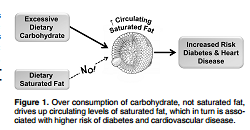I stumbled across this journal article the other day. At first I was intrigued and a bit excited; sometimes reviews have some tidbits of information or put together a new perspective from research papers in a particular area. However for any low-carb veterans I would ultimately rule this paper as uninspiring, at best. And, at worst, likely intended as a targeted book advertisement for Phinney and Volek’s book, The Art and Science of Low Carbohydrate Living. (Which, BTW, is one of the best low carb resources in print. Don’t get me wrong about that, I just hate it when authors end a paper peddling one of their products.)
So back to their paper: The review starts by rehashing the heart hypothesis and the lack of evidence that dietary saturated fats contribute to serum saturated fats, etc, etc. Then they re-introduce their two studies where they find that low carbohydrate diets significantly reduce the proportionate and absolute amounts of circulating saturated fat, on both a restricted caloric diet and on a maintenance one. They hypothesize that lower insulin levels may decrease activity of enzymes involved in de novo lipogenesis which produce saturated fatty acids. I am completely on board and with them at this point up until this illustration, at which point the science bubble pops rather abruptly.

Words escape me. There was no better graphic they could have used? Really? I guess we could always use this as the Explain Like I’m Five definition of why the heart hypothesis is wrong, and only if we’re really desperate and our five year old doesn’t ask, “why?”
There is one final “in summary” paragraph to finish off this already heavily summarized paper, they tell people to focus on finding their “right” level of carbohydrate. What is “right”? I’ll tell what’s right… It’s in the book by the authors that you’ll just have to buy, I guess. Awesome advertising Volek and Phinney, but this is fairly shoddy scientific writing and I am officially calling you out on it.
Resources
- The Twisted Tale of Saturated Fat, Stephen Phinney and Jeff Volek, May 2012, Lipid Technology
- The Art and Science of Low Carbohydrate Living, Stephen Phinney and Jeff Volek.


Wow. Hell hath no fury like a journal reader scorned. 😛 You’re pretty hard core, katkinsk!
From Phinney and Volek’s, The twisted tale of saturated fat:
NO, NO, NO!
It is over-consumption of carbohydrates – period. It is not glucose intolerance. It is insulin excess (enthusiasm?) Insulin reacts to glucose over-consumption. If the amount of glucose is greater than the body can use, insulin prevents disruption of the blood glucose level by diverting excess glucose to a number of pathways, only one of which is de novo lipogenesis.
A suggestion for the last two sentences:
This leads to the paradoxical conclusion that dietary saturated fat is not the problem; rather it’s the nutritional insult of over-consumption of carbohydrate relative to the individual’s ability to accept the insult without taking any counter measures. From this perspective, the noninfectious chronic diseases can be viewed as nutritional-insult intolerance, in which unhealthful dietary intakes translate to increased chronic inflammation and therefore increased risk.
A Parody: The twisted tale of WOS
Recent research results mandate a careful re-evaluation of the widespread belief that the wearing of skirts (WOS) is harmful. Specifically, multiple recent reports find no association between WOS and breast cancer. There is, however, a consistent pattern of increased occurrence of breast cancer in the segment of the population most prone to engage in WOS. This raises the important question of what is WOS’s contribution to the increasing attack rates of breast cancer. Whereas in today’s modern society female gender and WOS show virtually no statistical relationship, female gender is associated with breast cancer. This leads to the paradoxical conclusion that WOS is not the problem; rather it’s the circumstance of femaleness among WOS devotees. From this perspective, diseases such as breast or uterine cancer can be viewed as female-gender intolerance, in which the occasion of female gender translates to a preference for WOS and therefore increased risk.
A & F: Love the clever parody!
I have a question: We know that carb tolerance varies individually. And it appears an unchallenged fact today that regardless of individual carb tolerance, the ingestion of carbs cause risk to all, though symptoms may not be evident (such as read in “Grain Brain”). You mention that increased risk is due to over-consumption of carbohydrates. The words “over-consumption” jump out at me.
Is it possible that not everyone needs to completely eliminate carbs to avoid risk? Thank you.
Many thanks for your kind words. And thank you for your insightful question.
The short answer is “anyone who does not over consume carbohydrates does not have to give up carbs. In fact, all humans require a small amount of carbohydrate everyday to provide glucose for maintaining normal blood glucose levels. This small amount is referred to as the amount of carbohydrate needed to spare protein. This is because the body will use protein (the nonessential amino acids) to make glucose if is deprived of this small amount of carbohydrate.
About glucose tolerance, there is no such thing. The word “tolerance” has a lot of meanings, but when applied to the human organism tolerance refers to the ability of the body to adapt to increasing the dose of a foreign substance (like a drug) with a decreasing response and the need for increasing the dose in order to maintain a constant response. The concept of tolerance does not apply to foods. “Intolerance” could be applied to a food if one is allergic to – or it could be used when one eats too much and get sick to the stomach. We know no other meaning,
Hope this is helpful.
It is. Thank you so much.